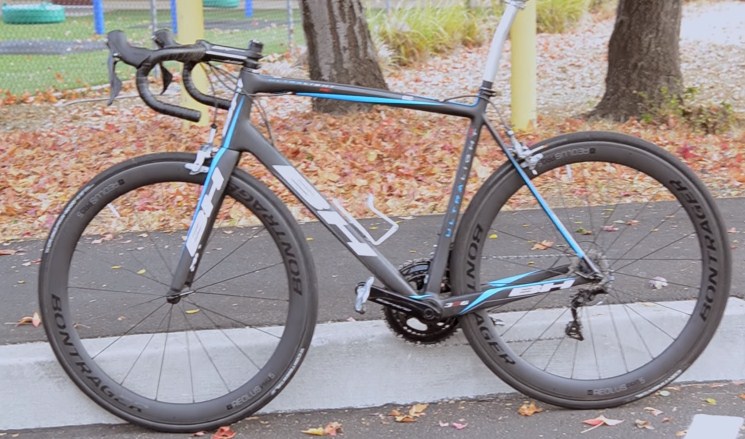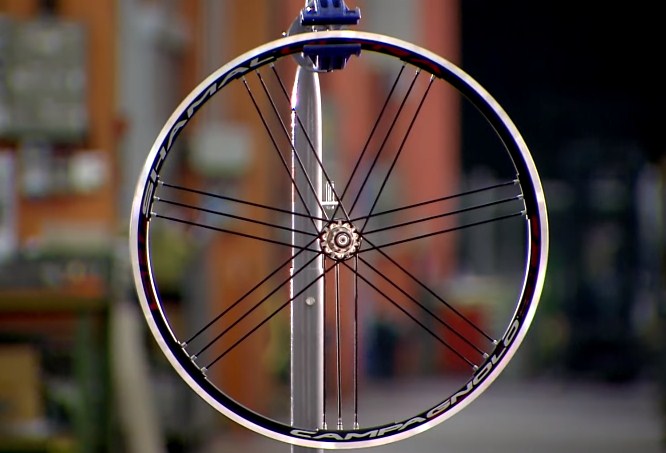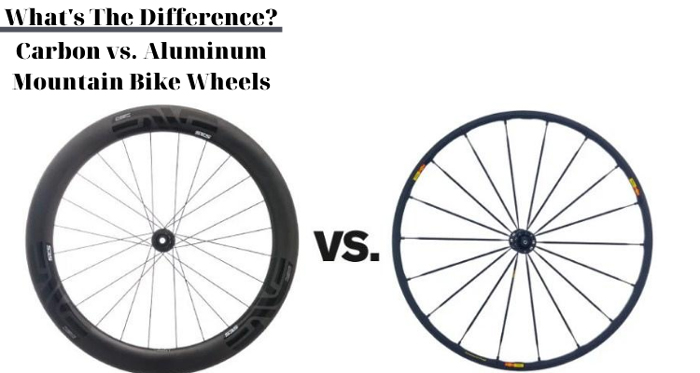Carbon vs Aluminum Mountain Bike Wheels
As you might have noticed, carbon wheels are very popular amongst road racers as almost all the pros use them. This has resulted in many people regarding carbon as the best material that can be used to manufacture bicycle wheels.
Carbon wheels are not just a thing for road cyclists, though, as more mountain bikers have started to replace their aluminum wheels with them. Wheels are probably the most important part of a bicycle as they directly after how well your bike will perform and how that riding experience will be.
Table of Contents
The aerodynamics of carbon wheels vs aluminum wheels

One of the main reasons people choose carbon wheels over aluminum wheels is that their design performs better in the wind. Some of the best wheel manufacturers have studied how fast bicycles can go at wind tunnels and have found that carbon wheels are better at reducing drag than aluminum wheels.
Aluminum box section rims are not good at cutting through the air as their carbon counterparts and this makes it affect how fast a wheel can turn. An uneven flow of air eddy currents can make it easier for them to collide with other sections of the wheel and their force can slow you down.
Another positive point about the aerodynamics of carbon wheels is that they make your wheels become more stable. Since they have fewer imperfections and are better shaped, they create pressure on their sides when moving straight and this makes it harder for the wheel to make unnecessary turns.
Braking performance

When it comes to braking, carbon fiber wheels have a bad reputation, especially their earlier versions. The carbon wheel’s braking problem is quite common on long descents and trickier trails that require you to brake more often.
Most of the time, carbon wheel tires tend to blow due to heat caused by the friction between the brakes and the rims. This problem worsens when you have to ride in hot conditions as carbon is not that great at absorbing heat compared to aluminum.
This overheating problem is not something that has been reported in carbon wheels only. Some people have admitted that their tires blew due to their aluminum rims overheating but these instances are very rare.
If you are a big fan of carbon wheels, don’t worry, there are now brakes that are made specifically to reduce the risk of overheating rims. There are also techniques that you can read about on cycling forums that will help you brake more effectively and safely on carbon wheels.
How long carbon rims can stay true when compared to aluminum rims?
Unlike aluminum, carbon rims are more likely to stay true for longer because they are built to be appropriately round and solid. Since carbon rims are built to be round from the start, being in a circular formation does not strain them.
What makes aluminum rims strain to stay in position is that they begin as straight long rods in their manufacturing process. To become round, they are bent into circular shapes; most of the time, four of these aluminum pieces are bent at the same time.
Since aluminum rims get bent easily, people who prefer them over carbon rims claim that beating them into shape is relatively easy.
Durability
When it comes to the durability of aluminum and carbon wheels, it is important to note that both materials can get severely damaged. However, carbon wheels are said to be stronger than their aluminum alternatives because they absorb impact better.
The ability to absorb impact in carbon wheels is what helps them spring back into shape even after being ridden repeatedly in rough terrain. Aluminum is also very durable and stiff but unlike carbon, this material is not adept at absorbing impact and creates microscopic cracks in wheels after every hard hit.
Over time, impact-induced microscopic cracks can create fatigue cracks on your wheel’s weak spots, such as the wades. These fatigue cracks can, in turn, result in a weaker frame and lessen your wheel’s stiffness and cause failure.
However, even though carbon is better at absorbing impact than aluminum wheels made out carbon break completely when they get hit super hard. Contrarily, aluminum wheels get bent after sustaining critical damage and can be banged into shape so you can continue with the trail.
Weight
People looking to shed a little weight from their bikes by switching to carbon wheels must be ready for a higher price tag. The common or cheap carbon wheel doesn’t weigh that much less than a good quality aluminum wheel and sometimes carbon wheels can be more expensive.
The fact that standard carbon wheels are not that light compared to aluminum wheels shouldn’t be a drawback. Lightweight carbon wheels are more likely to break after sustaining heavy impacts.

